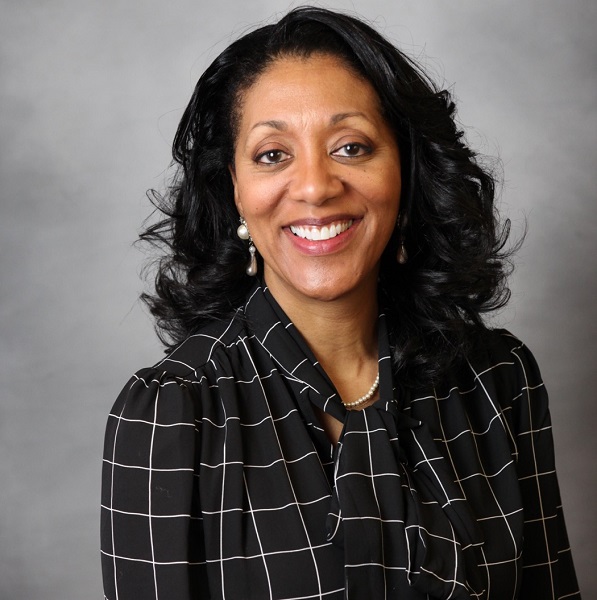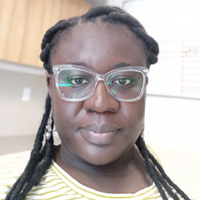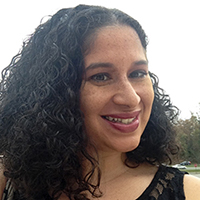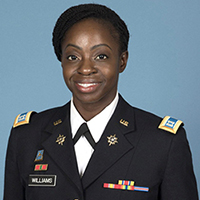Shining a Black Light Week One
February 1, 2022
 The 2021 Shining a Black Light campaign elevating Black History Month and recognizing our colleagues' contributions and achievements was highly successful. Therefore, we again endeavor to celebrate Black History Month 2022 with this weekly editorial feature.
The 2021 Shining a Black Light campaign elevating Black History Month and recognizing our colleagues' contributions and achievements was highly successful. Therefore, we again endeavor to celebrate Black History Month 2022 with this weekly editorial feature.
This project, conceived by Veronica Carey, PhD, the assistant dean of Diversity, Equity, and Inclusion and chair of CNHP's board of Diversity, Equity and Inclusion, spotlights individuals who add richness to our culture and contribute to the success of our efforts in education, research and scholarship, health equity and social justice.
"Shining a 'Black Light elevates the depth and breadth of contributions our Black and African American faculty, professional staff and students make to the sustainability of CNHP," shared Carey. Peers and colleagues recommended members of the CNHP community this year because of their accomplishments and the influence their work has on the College. Their lived experience and insight help shape what is possible concerning race-culture and inclusivity at CNHP/Drexel.
Shining a Black Light draws attention to the gifts, support, competencies and contributions members of our community are making and demonstrate that Black history is made through hard work, perseverance, and so much more.
 Cynthia Klobodu, MBChB, MPH is a third-year doctoral candidate in the Nutrition Sciences Department at the College of Nursing and Health Professions (CNHP). She’s a research fellow in the Community Nutrition lab where her faculty advisor is associate professor Brandy-Joe Milliron, PhD, a member of the Drexel Food Core lab and the AgeWell Collaboratory student advisory board. As part of her work with the Drexel Food Core and Community Nutrition labs, Cynthia is involved in several food product’s development, nutrition research and presentations. She is the recipient of the 2021 American Society for Nutrition Foundation (ASNF) Mars, Inc. Predoctoral Fellowship and CNHP’s PhD Student Research Award. Cynthia has collaborated with faculty members to develop manuscripts published in peer-reviewed journals. Her research interests include maternal and child nutrition, global nutrition, cancer survivorship, fertility nutrition, food waste management and sustainability and WASH. Her dissertation research is focused on exploring how nutrition can be used to support fertility treatment among female cancer survivors.
Cynthia Klobodu, MBChB, MPH is a third-year doctoral candidate in the Nutrition Sciences Department at the College of Nursing and Health Professions (CNHP). She’s a research fellow in the Community Nutrition lab where her faculty advisor is associate professor Brandy-Joe Milliron, PhD, a member of the Drexel Food Core lab and the AgeWell Collaboratory student advisory board. As part of her work with the Drexel Food Core and Community Nutrition labs, Cynthia is involved in several food product’s development, nutrition research and presentations. She is the recipient of the 2021 American Society for Nutrition Foundation (ASNF) Mars, Inc. Predoctoral Fellowship and CNHP’s PhD Student Research Award. Cynthia has collaborated with faculty members to develop manuscripts published in peer-reviewed journals. Her research interests include maternal and child nutrition, global nutrition, cancer survivorship, fertility nutrition, food waste management and sustainability and WASH. Her dissertation research is focused on exploring how nutrition can be used to support fertility treatment among female cancer survivors.
“Equity and inclusion provide equal opportunities for everyone to thrive and offers a free space for us to operate to the best of our abilities to achieve the college’s and university’s common goal. Students also get the opportunity to learn how to work in a diverse and inclusive society. I’d love to see more Black/African American people in the field of nutrition and dietetics, and I hope that we as a collective body can do more to encourage Black people’s interest in this field of health”.
A fun fact about Cynthia is that she likes to listen to Afrobeat music.
 Blair Chase, LPC, ATR-BC, is an adjunct professor of Art Therapy and Counseling at Drexel University as well as other mental health counseling programs in need within the university. He is also a full-time student in the CNHP’s inaugural class of the advanced clinical Doctorate in Couples and Family Therapy (DCFT) program. Blair serves as a student member on the Board of Diversity, Equity and Inclusion for CNHP. Blair is a full-time couples and family art therapist at Family Practice & Counseling Network (Stephen and Sandra Sheller 11th Street Family Health Services), a non-profit multidisciplinary organization that provides person-centered, integrated and comprehensive health services to individuals and families across their lifespan.
Blair Chase, LPC, ATR-BC, is an adjunct professor of Art Therapy and Counseling at Drexel University as well as other mental health counseling programs in need within the university. He is also a full-time student in the CNHP’s inaugural class of the advanced clinical Doctorate in Couples and Family Therapy (DCFT) program. Blair serves as a student member on the Board of Diversity, Equity and Inclusion for CNHP. Blair is a full-time couples and family art therapist at Family Practice & Counseling Network (Stephen and Sandra Sheller 11th Street Family Health Services), a non-profit multidisciplinary organization that provides person-centered, integrated and comprehensive health services to individuals and families across their lifespan.
In terms of equality and inclusion at CNHP/Drexel, the DEI board, Dr. Carey and other social justice advocates at Drexel have been exerting pressure on the university to not only see the need for more inclusion but to truly understand and value that need. Currently, very few university programs stress the importance of ethnic and cultural self-awareness within their related professions. As a result, students of color graduate with only a “textbook” idea of how to succeed within their fields without any understanding of how their ethnic and cultural identities can be their greatest strength to their professional success. Students of color cannot be successful in life without knowing what is important to their white counterparts, but the reverse is not true. This microaggression puts students of color at a emotional disadvantage entering the workplace as they battle between two identities: their authentic self and the self they have been taught is “most appropriate” in the workplace. Drexel can change this by encouraging our BIPOC students to advocate for their cultural backgrounds as an asset, not a liability to their professional careers!
A fun fact about Blair is that he is a proud brother of Alpha Phi Alpha Fraternity, Inc., the first intercollegiate Greek-letter fraternity established for African American men.
 Kusuma Schofield, MSEd, MPH, is administrative coordinator for Pennsylvania Supplemental Nutrition Assistance Program. "I think the very nature of the work I do at Drexel epitomizes the accomplishments I have achieved. Working with the different populations in the School District of Philadelphia while at Drexel over the past fifteen years has given me the knowledge and insight to climb higher and reach my own goals. This year I have successfully submitted two abstracts, one of which has already been accepted for a February speed talk. We have prepared two more abstracts for submission, as well as a manuscript in the works for 2022. This work has also made me a huge proponent of higher-level change. I work with the American Public Health Association’s Food and Nutrition Policy committee to write recommendations for policy stance consideration at the House and Senate levels. I was also just promoted to the co-chair position for the APHA education board, a part of the APHA governing boards and councils, which strives to evaluate educational opportunities provided by the organization and assure a better-educated public health workforce and more informed public. In the next term, I will serve as chair. I will be defending my PhD dissertation proposal on February 2nd so by the time you read this I will officially be a PhD candidate in nutrition sciences!
Kusuma Schofield, MSEd, MPH, is administrative coordinator for Pennsylvania Supplemental Nutrition Assistance Program. "I think the very nature of the work I do at Drexel epitomizes the accomplishments I have achieved. Working with the different populations in the School District of Philadelphia while at Drexel over the past fifteen years has given me the knowledge and insight to climb higher and reach my own goals. This year I have successfully submitted two abstracts, one of which has already been accepted for a February speed talk. We have prepared two more abstracts for submission, as well as a manuscript in the works for 2022. This work has also made me a huge proponent of higher-level change. I work with the American Public Health Association’s Food and Nutrition Policy committee to write recommendations for policy stance consideration at the House and Senate levels. I was also just promoted to the co-chair position for the APHA education board, a part of the APHA governing boards and councils, which strives to evaluate educational opportunities provided by the organization and assure a better-educated public health workforce and more informed public. In the next term, I will serve as chair. I will be defending my PhD dissertation proposal on February 2nd so by the time you read this I will officially be a PhD candidate in nutrition sciences!
I think advocacy needs to be at the forefront of our college. What key skills do our employees possess that will enhance our ability to make formative higher-level changes? What are we doing as a group to help our fellow citizens of Philadelphia? When politically charged events occur – what can we do as a college to support our colleagues who may be uncomfortable during times of strife (Beyond an email recognition)? Years ago I participated in a lunchtime women’s mentorship group at Drexel where leaders from around the college would speak about their careers and how they reached opportunities. I believe we tried to create an LGBTQ group. Have we thought about forming a women of color group? I am a part of a few and can attest to the level of comradery achieved when you can speak openly and freely in a group that will understand your lived experience. Overall, I think the college needs to think about: How can we use the brilliant minds in our college to advocate for change and what additional social supports can we put in place for our colleagues?
A fun fact about me: I have a musical family: My cousin played saxophone for Earth, Wind and Fire for many years and his brother plays drums for Gladys Knight (his nickname is ‘Footz’ because he plays drums with no shoes on!)."
 Linda Williams is U.S. Army veteran and a dance/movement therapy (DMT) student at Drexel University’s College of Nursing and Health Professions. Linda is a research assistant with Drexel University Creative Arts PhD candidate Nalini Prakash’s study on the impact of DMT on empathy peer relationships and ethnic bullying.
Linda Williams is U.S. Army veteran and a dance/movement therapy (DMT) student at Drexel University’s College of Nursing and Health Professions. Linda is a research assistant with Drexel University Creative Arts PhD candidate Nalini Prakash’s study on the impact of DMT on empathy peer relationships and ethnic bullying.
She is also a student member of the American Dance Therapy Association and serves as the Maryland/Virginia/ DC chapter’s government liaison. Linda is currently a candidate for the Philanthropic Educational Organization’s Continuing Education grant. A lifelong dancer, she is trained in Afro-Cuban dance, house, dancehall and other various dance forms. Always looking to expand her knowledge of and expertise in the human mind-body connection, Linda is also a certified personal trainer, group fitness instructor and licensed Zumba instructor. Linda continues to serve as an Army officer, with over 14 years of military service.
“Drawing from my military experience, I’ve observed that equity and inclusion foster a deeper sense of community and belonging within my military unit. We operated like a family and as a result, there was a deeper commitment to achieving the mission at hand. While I am new to the CNHP/Drexel community, I’m learning how imperative group cohesion is in creating a sense of belonging and the effect these factors have on a group’s zealousness, not only to achieve but to exceed previously set expectations.”
Fun Fact: Linda is in the process of launching a public health “groovement” called Groove and Move, that connects both veterans and people in her community to the healing benefits of dance and movement.